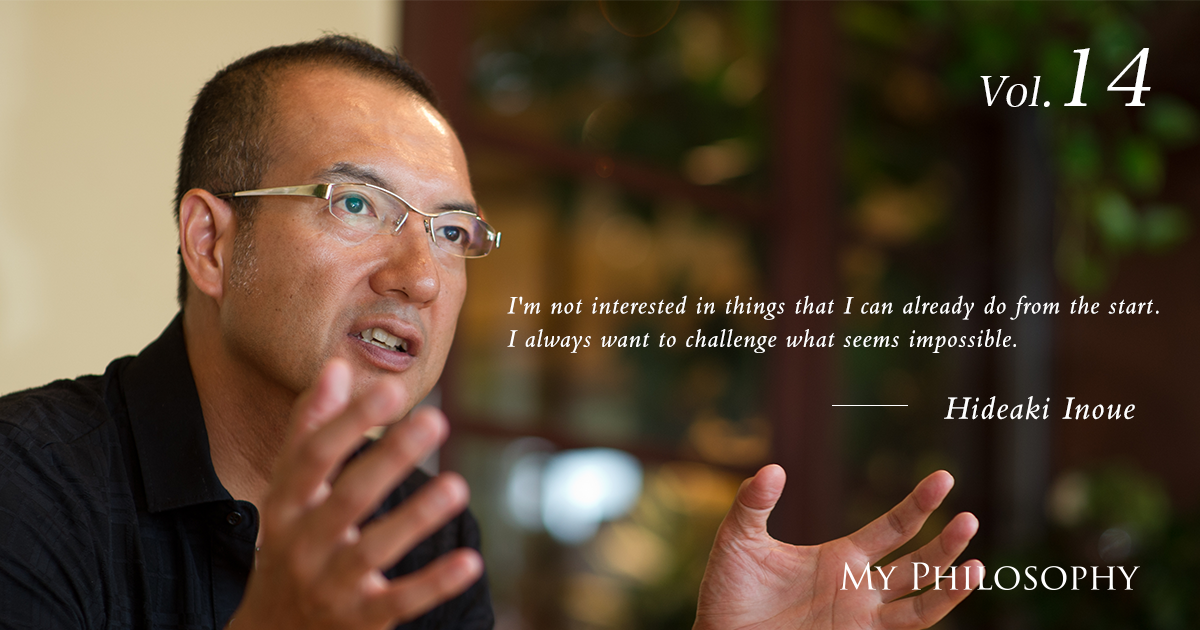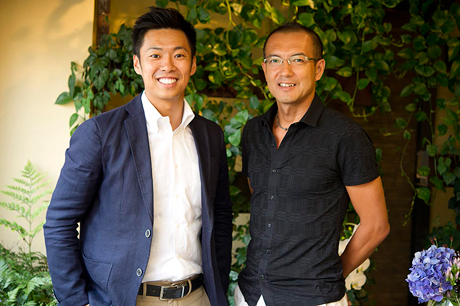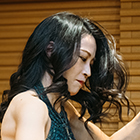
Mr. Hideaki Inoue has grown Aoyama Flower Market to over 80 stores nationwide and has boldly ventured into new businesses, including specialty stores for greens and triathlons. We asked this ever-evolving entrepreneur about his company's future plans and what he values the most.
Profile
Vol.14 Hideaki Inoue
President and CEO, Park Corporation
Hideaki Inoue was born in Saga Prefecture in 1963. After graduating from the School of Political Science and Economics at Waseda University, he moved to the United States in 1987. He worked as an accountant at a major accounting firm in New York but resigned after one year. In 1988, he founded Park Corporation. Starting the cut flower business in 1989, he opened the first Aoyama Flower Market store in 1993. Currently, he has expanded to over 80 stores nationwide. In 2003, he opened the flower school "hana-kichi", in 2007 the specialty store for greens "Jungle COLLECTION", and in 2011 the café "TEA HOUSE". In 2008, aiming to promote triathlon, he established Athlonia Corporation and became a board member. His hobby is triathlon.
※The titles and information are as of the time of the interview in August 2012.
It’s Meaningless unless It is Created from Scratch.
I refer to Park Corporation as a “Brand Breeding Company” of my own accord. While there are companies that use the term “brand incubation,” they typically focus on discovering and nurturing existing ‘eggs,’ which doesn’t interest me much. I am more interested in creating a brand from scratch, similar to how crossing different breeds can produce new varieties of flowers. The question then becomes, what do we cross? The answer lies in the Japanese strength of the right brain, or in other words, sensibility. However, people with good sensibilities often aren’t skilled at management, so I believe it’s necessary to support and cherish the exquisite Japanese sensibility from behind firmly. The fusion of right and left brains, balancing creativity with management, is crucial.
Take Athlonia, for instance (a triathlon specialty store launched in 2008 where I serve as a director). It began with combining the sensibility of the athlete Taro Shirato with our management skills. It’s always about experimenting to see what comes out when we try something new. I’m not interested in things that are already made; it must be created from zero to have meaning.

From a young age, I liked the idea of ‘not knowing until you try.’ When I was in kindergarten, I woke up early one morning to ride my new bicycle to a distant relative’s house just to see if I could make it. Growing up in the countryside of Saga, there were sumo tournaments, and since I was bigger than my classmates, winning was easy, which I found boring. To find stronger opponents, I challenged older kids who were leaders.
My great-great-grandfather traveled to America during the Saccho-Dohi era, so maybe it’s in my genes. I just love to take on challenges. It’s not about being sore losers; if that were the case, I’d only play games I know I could win. But losing is fine by me. I’m not interested in things I already know I can do; I always want to challenge what seems impossible.
The Future of Aoyama Flower Market in 10 years.
I believe that florists can generally be classified into three types. The first type is what you might call a traditional florist. These are like the French or Italian restaurants of the floral industry, dealing with expensive flowers used for special occasions like weddings and funerals. The second type is more like the flower stalls you see at grocery stores. These sell flowers as mere materials at a lower price point, without added value—essentially, they are the greengrocers of the flower world. The third type is in between these two extremes. These florists add value to the flowers, akin to a deli that offers ready-to-eat dishes that can be easily enjoyed at home. They are not as elaborate as a French restaurant, but they allow you to effortlessly enjoy a pleasant atmosphere at home. This is the concept behind Aoyama Flower Market.
When I opened the first Aoyama Flower Market in 1993, I envisioned eventually expanding to about 200 stores. My idea was to propose a lifestyle where people would buy their groceries, bread, wine, and flowers all in one place, so it made sense for Aoyama Flower Market to be located in places like those where ROCK FIELD(RF1), a prepared foods shop, had its outlets. At the time, I found out that ROCK FIELD had about 200 stores.
Currently, Aoyama Flower Market has 81 stores nationwide. Looking forward to the next ten years, I want to both deepen and broaden our scope.
By “deepening,” I mean enhancing and tightening our relationships with customers. Since flowers are perishable goods, the ideal scenario is to ship them directly from the growers. We plan to establish greenhouses at the producers’ locations, select all the varieties ourselves, and then deliver directly from there to our stores and customers.
In terms of “broadening,” I am looking to expand not only domestically but also internationally. Just as we have expanded from one store to two, then from ten to twenty across Tokyo, Hokkaido, Kansai, and Kyushu, I envision a similar horizontal expansion from Japan to international markets. The initial focus will be on opening stores in Paris, followed by New York, and then moving into Asia.
I want to Cultivate Talented Individuals for our International Expansion.

The reason we chose Paris as our first international location is because of the city’s exceptional sensibility and color perception. Rather than focusing solely on profits from opening a store in Paris, I am more interested in cultivating talented individuals there.
I feel it’s too early to expand into Asia right now. For instance, in China, people tend to spend money on items to show people, like bags, cars, and watches, but are less willing to spend on things that enrich their personal enjoyment and lifestyle. The flowers we deal with are meant to enrich one’s spirit and provide personal enjoyment, unlike the lavish decorative flowers used for weddings. The cultural appreciation for this kind of spending just isn’t there yet.
Our plan is to send core personnel from Japan to Paris and New York to enhance their sense of color and aesthetics, thereby elevating the quality of our shops in Japan and developing individuals who can also be effective in Asia. The idea is to absorb knowledge in Paris and New York and then apply it in Asia. Our overseas locations will serve not only as stores but also as training centers. By expanding internationally, we attract global talent, which ultimately strengthens our recruitment efforts.
The key individuals we are looking for need to have a balanced blend of creative sensibility and management skills. Currently, in each of our stores, we separate roles between shop creators and shop managers, and between brand creators and brand managers, dividing the creative right-brain activities from the left-brain management tasks. However, when opening stores overseas, we require individuals who can handle both roles. The timing of our Paris store launch depends on when we can find such talent. Business is fundamentally about people. Without the right talent, there’s little we can do.
The Most Important Thing is ‘Elevation.’
In both managing a company and living life, the most important concept I hold dear is “elevation,” which means self-improvement. The question of why people live can be answered by the pursuit of continuously refining oneself throughout one’s life. Tempu Nakamura, who emphasized the importance of how much one can grow oneself. My primary focus is on constantly improving myself, never wasting a single minute or second. This is both the most important thing to me and what I am most interested in. I always tell my staff, “Use the company to polish yourself; your job is the ‘whetstone’ for self-improvement, and the company is the ‘dojo’ for learning.” Thinking this way naturally leads to valuing time more.
As for my personal future, I aim to maintain a body that can compete in triathlons until I’m 80 years old. Around the age of 70, I would like to participate in the Ironman World Championship in Hawaii. I started triathlon at the age of 40 and have realized the importance of establishing habits as early as possible. It is better to start at 40 than at 50, and even better at 30. Taking on challenges is also an opportunity to grow. I believe that adults who are both intelligent and physically fit remain admirable at any age.

I really admire Aoyama Flower Market’s concept of making flowers a part of everyday life. Perhaps because I have lived overseas for a long time, I naturally think that giving flowers routinely is a normal thing to do.
I have wanted Mr. Hideaki Inoue, the CEO of Aoyama Flower Market, to appear in “My Philosophy” for some time. I had the opportunity to convey my passionate thoughts when we met at a friend’s anniversary party, and he graciously accepted the invitation. In the interview, he mentioned that “it’s meaningless unless it starts from zero,” reflecting a management attitude that is essential in today’s rapidly changing world, where creating new value rather than tracing the past is crucial.
I also empathize with his participation in triathlons and was inspired by our meeting to purchase a triathlon bike the day after the interview from Athlonia, where Mr. Inoue serves as a director. I aspire to emulate his proactive approach to trying new things, whether as a business leader, an athlete, or a father.
Edited by Mayumi Akiyama and photographed by Daiki Ayuzawa at Park Corporation, August 2012.






























































































































